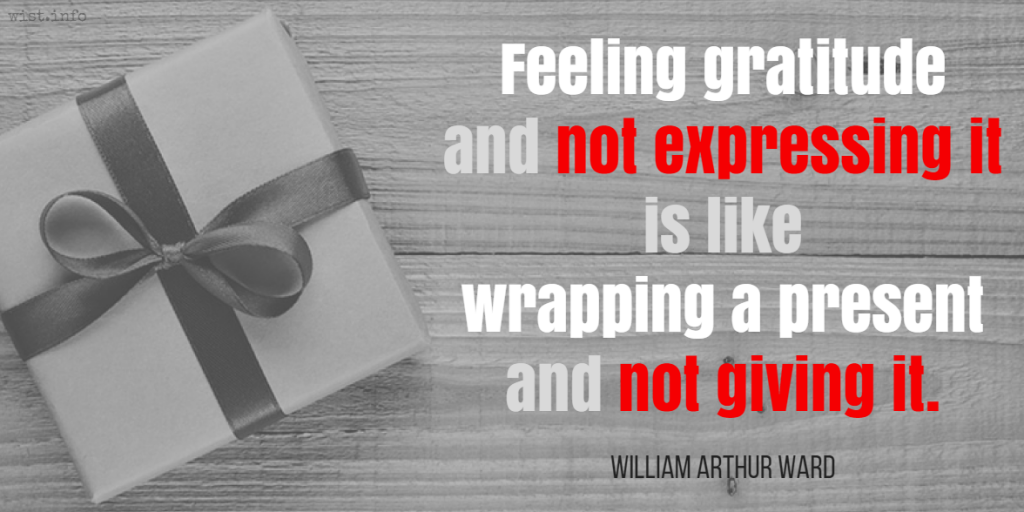Iz it charity tew giv tew a thankless cuss in need? certainly; jest az mutch az it would be to save a drouning cow.
[Is it charity to give to a thankless cuss in need? Certainly; just as much as it would be to save a drowning cow.]
Josh Billings (1818-1885) American humorist, aphorist [pseud. of Henry Wheeler Shaw]
Everybody’s Friend, Or; Josh Billing’s Encyclopedia and Proverbial Philosophy of Wit and Humor, ch. 132 “Affurisms: Chips” (1874)
(Source)
Quotations about:
gratitude
Note not all quotations have been tagged, so Search may find additional quotes on this topic.
So new, so smooth, my dainty book,
A gift for whom? Cornelius, look,
‘Tis yours: for you in early days
Were ever wont my rhymes to praise.[Cui dono lepidum novum libellum
arido modo pumice expolitum?
Corneli, tibi; namque tu solebas
meas esse aliquid putare nugas.]Catullus (c. 84 BC – c. 54 BC) Latin poet [Gaius Valerius Catullus]
Carmina # 1 “To Cornelius Nepos,” ll. 1-4 [tr. MacNaghten (1925)]
(Source)
Dedication of the collection (though the canonical collection of Catullus's poems is dubious in its provenance).
(Source (Latin)). Alternate translations:
With pumice dry just polish'd fine,
To whom present this book of mine;
This little volume smart, and new? --
Cornelius, I will give it you:
For then you oft were wont to say
Some trifling merit had my lay.
[tr. Nott (1795)]
My little volume is complete,
With all the care and polish neat
That makes it fair to see:
To whom shall I then, to whose praise,
Inscribe my lively, graceful lays?
Cornelius, friend, to thee.
[tr. Lamb (1821)]
My little volume is complete,
And with the pumice made as neat
As tome need wish to be;
And now what patron shall I choose
For thee gay sallies of my muse?
Cornelius, whom but thee?
For though they are but trifles, thou
Some value didst to them allow.
[tr. T. Martin (1861), st. 1-2]
To what dear friend, say, shall I dedicate
My smart new book, just trimm'd with pumice dry?
To thee, Cornelius -- for, in years gone by,
Thou was accustom'd my light lays to rate
As something more than trifles.
[tr. Cranstoun (1867)]
My little book, that's neat and new,
Fresh polished with dry pumice stone,
To whom, Cornelius, but to you,
Shall this be sent, for you alone --
(Who used to praise my lines, my own) ....
[tr. Lang (1888)]
To thee (Cornelius!); for wast ever fain
To deem my trifles somewhat boon contain.
[tr. Burton (1893)]
To whom inscribe my charming new book -- just out and with ashen pumice polished? Cornelius, to you! for you used to deem my triflings of account.
[tr. Smithers (1894)]
To whom am I to present my pretty new book, freshly smoothed off with dry pumice stone? To you, Cornelius: for you used to think that my trifles were worth something, long ago.
[tr. Warre Cornish (1904)]
To whom shall I offer this book, young and sprightly,
Neat, polished, wide-margined, and finished politely?
To you, my Cornelius ....
[tr. Stewart (1915)]
To whom shall I offer my new little book
Looking as polished as parchment can look?
Cornelius, to thee, for 'twa thou who didst prize
My trifles as something e'en then in thine eyes.
[tr. Symons-Jeune (1923)]
To whom this dainty booklet polished new
With pumice stone? Cornelius, to you.
For you were wont my versicles to praise
As things of value in those bygone days.
[tr. Wright (1926), ch. 3]
Who shall receive my new-born book,
my poems, elegant and shy,
neatly dressed and polished?
You, Cornelius,
shall by my single patron,
for, long ago, you praised my slender lines and stanzas.
[tr. Gregory (1931)]
Whom do I give my neat little volume
slicked dry and made fashionable with pumice?
Cornelius, to you: remindful that you
used to dwell on my scantlings as something great.
[tr. Zukofsky (1959)]
To whom will I give this sophisticated,
abrasively accomplished new collection?
To you, Cornelius! You had the habit
of making much of my poetic little.
[tr. C. Martin (1979)]
To whom do I send this fresh little book
of wit, just polished off with dry pumice?
To you, Cornelius: since you were accustomed
to consider my trifles worth something
even then.
[tr. Kline (2001)]
To whom do I dedicate this charming slim volume,
just now polished with dry pumice stone?
For you Cornelius, for you were accustomed to think
that my scribblings were something.
[tr. Ozlem (2003)]
Who's the dedicatee of my new witty
booklet, all fresh-polished with abrasive?
You, Cornelius: for you always used to
feel my trivia possessed some substance.
[tr. Green (2005)]
To whom to give this charming little book
dryly polished with a pumice stone?
To you, Cornelius: you used to think
my trivial little scribbles worth a look.
[Source (2011)]
Who is it I should give my little book to,
So pretty in its pumice-polished covers?
Cornelius, I'll give my book to you:
Because you used to think my nothings somethings.
[tr. Ferry (2012)]
To whom do I give this pleasing new little book,
Just now smoothed with dry pumice?
To you, Cornelius: For you were accustomed
To consider my trifles to be something.
[tr. Wikibooks (2017)]
To whom do I give this elegant new booklet,
polished just now with dry pumice?
To you, Cornelius! Since you always
thought my doggerel was worth something.
[tr. Wikisource (2018)]
One single grateful thought towards heaven, is the most perfect prayer!
[Ein einziger dankbarer Gedanke gen Himmel ist das vollkommenste Gebet!]
Gotthold Lessing (1729-1781) German playwright, philosopher, dramaturg, writer
Minna von Barnhelm, Act 2, sc. 7 [Minna] (1763) [tr. Holroyd/Bell (1888)]
(Source)
(Source (German)). Alternate translation:
A single grateful thought toward heaven is the most perfect prayer.
[Source (1884)]
Can I forget your many favours? Nay.
Why don’t I mention them? Because you do.
If I begin, some one is sure to say
“Your patron told me all he did for you”;
Friend there are tasks cannot be done by two;
Shall this be yours or mine? for I submit
However great a gift, there nothing due
To any giver who shall boast of it.[Quae mihi praestiteris memini semperque tenebo.
Cur igitur taceo, Postume? Tu loqueris.
Incipio quotiens alicui tua dona referre,
Protinus exclamat ‘Dixerat ipse mihi.’
Non belle quaedam faciunt duo: sufficit unus
Huic operi: si vis, ut loquar, ipse tace.
Crede mihi, quamvis ingentia, Postume, dona
Auctoris pereunt garrulitate sui.]Martial (AD c.39-c.103) Spanish Roman poet, satirist, epigrammatist [Marcus Valerius Martialis]
Epigrams [Epigrammata], Book 5, epigram 52 (5.52) (AD 90) [tr. Pott & Wright (1921), “Self-Praise”]
(Source)
"To Postumus." (Source (Latin)). Alternate translations:
Thy gifts to me I thinke of, and still shall.
Why then do I not speake of them at all?
Thou dost. Where ere I tell thy charitie,
Tis answer'd straight, himselfe has told it me.
This work befits not both; one is enough;
If thou wouldst have me speake, be silent thou.
For (trust me) wert thou nere so liberall,
The givers talking would destroy it all.
[tr. May (1629), ep. 53]
What thou conferr'st on me I do
Remember, and shall think on, too.
Why therefore do I hold my tongue?
Cause, Posthumus, thou ne'er hast done.
As often as I go to treat
of these thy gifts to them I meet,
'T is presently replied, "Forbear,
He whisper'd it into my ear."
Two men some things cannot do well:
One person may suffice to tell,
and do this work: if it may please
That I shall speak, then hold thy peace.
For prithee, Postumus, believe,
Though that thy gifts are great to give
All thanks must perish, and are lost,
When authors their own actions boast.
[tr. Fletcher (1656)]
Your favors to me I remember well;
But do not mention them; because you tell.
Whenever I begin, I'm answer'd strait,
"I heard from his own mouth, what you relate."
Two ill become the business of but one;
Be you but silent, I will speak alone.
Great are your gifts; but when proclaim'd around,
The obligation dies upon the sound.
[tr. Hay (1755), ep. 53]
The services you have rendered me I do not forget, and will always keep them in my mind. How happens it, Posthumus, that I am silent? It is because you talk. Do I begin to expatiate on your favours, I am told, "I heard all about it from himself." Some things are not handsomely performed by two; one person is enough to relate kindness; if you wish me to speak, you must remain silent. The merit of gifts, however great they be, is lost by the garrulity of the giver.
[tr. Amos (1858), ch. 3, ep. 78; ep. 53]
Your services to me I remember, and shall never forget Why then am I silent about them, Postumus? Because you yourself talk of them. Whenever I begin to speak to any one of your favours, he immediately exclaims, "He has told me of them himself." There are certain things which cannot be well done by two people; one is enough in this case. If you wish me to speak, keep silence yourself. Believe me, Postumus, gifts, however great, are deprived of their value by garrulity on the part of the donor.
[tr. Bohn's Classical (1859)]
I'm grateful for your favors;
They'll never be forgot.
You wonder why I'm dumb about 'em?
Just because you're not.
Whenever I start telling
Of kindnesses you'd done,
The tale, I find, you'd quite concluded
Long ere I'd begun.
Now two men spoil the business
That one does well alone.
If I 'm desired to open my mouth,
Kindly shut your own.
[tr. Nixon (1911)]
Your bounty to me I remember and shall always keep in mind. Why, then, and I silent about it, Postumus? You speak of it. As often as I begin to report to someone your presents, he at once exclaims, "He himself had told me." These are things which two persons do not do nicely: one suffices for this work' if you want me to speak, be you yourself silent. Trust me; gifts, however great, Postumus, lose their value by the chattering of the giver.
[tr. Ker (1919)]
Grateful for all your gifts I still shall be;
"Why then be silent?" Well, you speak for me.
If to a friend your kindness I report,
With, "Yes, he told me so" he cuts me short.
Some tasks are not so suitable for two,
So thank you, Postumus, I'll wait for you.
Believe me, gifts, however rich they be,
Lose all their value by loquacity.
[tr. Francis & Tatum (1924), #251]
I remember all you have done for me and shall ever keep it in mind. Why then do I say nothing about it, Postumus? You talk. Whenever I start to tell somebody of your generosity, he exclaims at once: "He tole me that himself." Some things are not nicely done by two. One is enough for this work. If you want me to talk, you must hold your tongue. Believe me, Postumus, the most magnificent of gifts are nullified by the garrulity of the giver.
[tr. Shackleton Bailey (1993)]
You are my patron, I would give you praise,
But when talk of your virtues I would raise,
I'm told you have already laid them out.
Where I would whisper, you your merits shout.
We must more prudently divide our labor
To have efficient impact on our neighbor.
If I'm to praise you, you must hold your peace,
Or give me from my gratitude release.
Your gifts do not give me the power to do
Promotion constantly undone by you.
You undermine my prized veracity
With puffings of your own loquacity.
[tr. Wills (2007)]
I'll always cherish what you’ve done for me.
Why don’t I speak of it? Because you do.
Whenever I tell someone of your bounty,
he cries at once: “He told me of it, too!”
Some things two can’t do well; just one suffices.
You must keep mum, if you want me to gush.
Believe me, Postumus, the greatest gifts
are canceled when the giver just won't hush.
[tr. McLean (2014)]
About your gifts I'd love to gush,
Instead, I feel I have to hush.
When I tell people, they don't doubt it:
You've already bragged about it.
Maybe we should coordinate
Who praises your largesse of late.
But gifts do lose their gleam and such
When givers praise themselves too much.
[tr. Hill (2023)]
While rivers run into the deep,
While shadows o’er the hillside sweep,
While stars in heaven’s fair pasture graze,
Shall live your honour, name, and praise,
Whate’er my destined home.[In freta dum fluvii current, dum montibus umbrae
lustrabunt convexa, polus dum sidera pascet,
semper honos nomenque tuum laudesque manebunt,
quae me cumque vocant terrae.]Virgil (70-19 BC) Roman poet [b. Publius Vergilius Maro; also Vergil]
The Aeneid [Ænē̆is], Book 1, l. 607ff (1.607-610) [Aeneas] (29-19 BC) [tr. Conington (1866)]
(Source)
Expressing undying gratitude to Dido for taking him and his soldiers in. He will then marry Dido, desert her, and leave her to her suicide. At least he gets haunted by her ghost in the Underworld.
(Source (Latin)). Alternate translations:
Whilst convex'd hills have shadows, to the maine,
Whilst rivers run, whilst poles the stars sustaine,
Thy honour; name, and same, shall last, what land
So-ever me invites.
[tr. Ogilby (1649)]
While rolling rivers into seas shall run,
And round the space of heav'n the radiant sun;
While trees the mountain tops with shades supply,
Your honour, name, and praise shall never die.
Whate'er abode my fortune has assign'd,
Your image shall be present in my mind
[tr. Dryden (1697)]
While the rivers to the sea
Shall run, -- while mountain shadows move around
Their sides, -- and while the heavens shall feed the
stars. So long thy honor, and thy name and praise
Shall last, whatever lands may call me hence.
[tr. Cranch (1872)]
While rivers run into the sea, while the mountain shadows move across their slopes, while the stars have pasturage in heaven, ever shall thine honour, thy name and praises endure in the unknown lands that summon me.
[tr. Mackail (1885)]
Now while the rivers seaward run, and while the shadows stray
O'er hollow hills, and while the pole the stars is pasturing wide,
Still shall thine honour and thy name, still shall thy praise abide
What land soever calleth me.
[tr. Morris (1900)]
O, while the rivers run
to mingle with the sea, while shadows pass
along yon rounded hills from vale to vale,
and while from heaven's unextinguished fire
the stars be fed -- so long thy glorious name,
thy place illustrious and thy virtue's praise,
abide undimmed. -- Yet I myself must go
to lands I know not where.
[tr. Williams (1910)]
While rivers run into the sea, while on the mountains shadows move over the slopes, while heaven feeds the stars, ever shall thy honour, thy name, and thy praises endure, whatever be the lands that summon me!
[tr. Fairclough (1916)]
While rivers run to sea, while shadows move
Over the mountains, while the stars burn on,
Always, your praise, your honor, and your name,
Whatever land I go to, will endure.
[tr. Humphries (1951)]
So long as rivers run to the sea, and shadows wheel round
The hollows of the hills, and star-flocks browse in the sky,
Your name, your fame, your glory shall perish not from the land
Wherever I am summoned to go.
[tr. Day-Lewis (1952)]
While rivers run into the sea and shadows
still sweep the mountain slopes and stars still pasture
upon the sky, your name and praise and honor
shall last, whatever be the lands that call me.
[tr. Mandelbaum (1971), l. 852ff]
So long as brooks flow seaward, and the shadows
Play over the moutnain slopes, and highest heaven
Feeds the stars, your name and your distinction
Go with me, whatever lands may call me.
[tr. Fitzgerald (1981), l. 828ff]
While rivers run into the sea, while shadows of mountains move in procession round the curves of valleys, while the sky feeds the stars, your honour, your name, and your praise will remain for ever in every land to which I am called.
[tr. West (1990)]
Your honour, name and praise will endure forever,
whatever lands may summon me, while rivers run
to the sea, while shadows cross mountain slopes,
while the sky nourishes the stars.
[tr. Kline (2002)]
While rivers run to the sea, while shadows
Move over mountainsides, while the sky
Pastures the stars, ever shall your honor,
Your name, and your praises endure,
Whatever the lands that summon me.
[tr. Lombardo (2005)]
So long as rivers run to the sea, so long as shadows
travel the mountain slopes and the stars range the skies,
your honor, your name, your praise will live forever,
whatever lands may call me to their shores
[tr. Fagles (2006), l. 727]
While rivers flow to the seas and shadows cross the moutnain slopes, while sky pastures the stars, your honor and your name and praise will last for me, whatever country calls.
[tr. Bartsch (2021)]
Write Injuries in Dust, Benefits in Marble.
Benjamin Franklin (1706-1790) American statesman, scientist, philosopher, aphorist
Poor Richard’s Almanack, “August” (1747)
(Source)
As with so much else of Franklin's, this phrase is not without earlier forms, e.g.: Thomas More, History of King Richard III (1513):
For men use, if they have an evil turn, to write it in marble; and whosoever does us a good turn, we write it in dust.
Or see Shakespeare, Henry VIII 4.2.45-46 (1613):
Men's evil manners live in brass, their virtues
We write in water.
Variants include "but kindnesses in marble" or "but kindness in marble."
This also shows up as a French saying in various forms:
- "Ecrivez les injures sur le sable, mais les bienfaits sur le marbre."
- "Écrivez les injures sur le sable, gravez les bienfaits sur le marbre."
We never get anywhere in this world without the forces of history and individual persons in the background helping us to get there.
Martin Luther King, Jr. (1929-1968) American clergyman, civil rights leader, social activist, preacher
“Conquering Self-Centeredness,” sermon, Dexter Ave. Baptist Church, Montgomery, Ala. (11 Aug 1957)
(Source)
Maybe the only thing worse than having to give gratitude constantly all the time, is having to accept it.
William Faulkner (1897-1962) American novelist
Requiem for a Nun, Act 2, sc. 1 [Temple] (1951)
(Source)
For there is no more essential duty than that of returning kindness received.
[Nullum enim officium referenda gratia magis necessarium est.]
Marcus Tullius Cicero (106-43 BC) Roman orator, statesman, philosopher
De Officiis [On Duties; On Moral Duty; The Offices], Book 1, ch. 15 (1.15) / sec. 47 (44 BC) [tr. Peabody (1883)]
(Source)
(Source (Latin)). Alternate translations:
For of all the virtues, there is none we are more necessarily obliged to, than gratitude.
[tr. Cockman (1699)]
For there is no duty of a more necessary obligation than returning a kindness.
[tr. McCartney (1798)]
For there is no duty more indispensable than that of returning a kindness.
[tr. Edmonds (1865)]
For no duty is more imperative than gratitude.
[tr. Gardiner (1899)]
There is no duty more obligatory than the repayment of a kindness.
[ed. Harbottle (1906)]
For no duty is more imperative than that of proving one's gratitude.
[tr. Miller (1913)]
No duty is more necessary than to return a favor.
[tr. Edinger (1974)]
Cain Mongfish’s masterpiece, A Reasoned Diatribe Regarding thee Methods and Required Madnesses Towards the Manipulation of ye Stuffe of Life and thee Entertaining Consequences Thereof and How Best to Avoid Them is regarded as the seminal work that gathered and codified all of the then-known processes for reanimating, bending, warping, and subjugating life as we know it. Cain died while researching a sequel, which according to his notes was to be entitled How to Promote and Manipulate thee Natural Fealty and Gratitude That Thine Creation Will Express Towards Thou, Their Creator. For some reason, that never works.
—Phil Foglio (b. 1956) American writer, cartoonist
Agatha H and the Voice of the Castle (2014) [with Kaja Foglio]
(Source)
Don’t be afraid to thank a servant. Do so quietly, but unmistakably, whenever thanks are in order.
Minna Antrim (1861-1950) American epigrammatist, writer
Don’ts for Bachelors and Old Maids (1908)
(Source)
The wise man would rather see men needing him than thanking him.
[El sagaz más quiere necessitados de sí que agradecidos.]
Baltasar Gracián y Morales (1601-1658) Spanish Jesuit priest, writer, philosopher
The Art of Worldly Wisdom [Oráculo Manual y Arte de Prudencia], § 5 (1647) [tr. Jacobs (1892)]
(Source)
(Source (Spanish)). Alternate translations:
A Man of Parts had rather meet with those who depend upon him, than that are thankfull to him.
[Flesher ed. (1685)]
He who knows, desires more that man shall need him than thank him.
[tr. Fischer (1937)]
He who is truly shrewd would rather have people need him than thank him.
[tr. Maurer (1992)]
When asked what ages quickly, he replied, “Gratitude.”
[ἐρωτηθεὶς τί γηράσκει ταχύ, “χάρις,” ἔφη.]
Aristotle (384-322 BC) Greek philosopher
Attributed in Diogenes Laërtius, Lives and Opinions of Eminent Philosophers [Vitae Philosophorum], Book 5, sec. 18 [tr. Mensch (2018)]
(Source)
(Source (Greek)). Alternate translations:
Once he was asked what grew old most speedily, and he replied, “Gratitude.”
[tr. Yonge (1853), sec. 11]
Being asked, "What is it that soon grows old?" he answered, "Gratitude."
[tr. Hicks (1925)]
When he was asked what grows old quickly, he said "thanks."
[tr. @sentantiq (2016)]
Since we all need reproving and rebuking, and since we all know that we need reproving and rebuking, we ought — if we were logical — to be extremely grateful to those who reprove and rebuke us. And I suppose that, sooner or later, we are; but almost invariably later.
For a guest remembers all his days the hospitable man who showed him kindness.
[Τοῦ γάρ τε ξεῖνος μιμνῄσκεται ἤματα πάντα
ἀνδρὸς ξεινοδόκου, ὅς κεν φιλότητα παράσχῃ.]Homer (fl. 7th-8th C. BC) Greek author
The Odyssey [Ὀδύσσεια], Book 15, l. 54ff (15.54) [Pisistratus] (c. 700 BC) [tr. Palmer (1891)]
(Source)
(Greek Source). Alternate translations:
Not a guest
Shall touch at his house, but shall store his breast
With fit mind of an hospitable man,
To last as long as any daylight can
His eyes recomfort, in such gifts as he
Will proofs make of his hearty royalty.
[tr. Chapman (1616)]
For guests use always to remember those
By whom they have been entertain’d with love.
[tr. Hobbes (1675), ll. 49-50]
For the guest in mem’ry holds
Through life, the host who treats him as a friend.
[tr. Cowper (1792), l. 64-65]
For when a host with friendship void of blame
Gives of his choicest, men observe his name,
And hold it all their lives exceeding dear.
[tr. Worsley (1861), st. 7]
Throughout his life,
A guest the gen'rous man should keep in mind
Who to is home hath welcom'd him.
[tr. Musgrave (1869), l. 88ff]
A guest remembers thro' life's livelong days
That host, who gives him sterling proofs of love!
[tr. Bigge-Wither (1869)]
For of him a guest is mindful all the days of his life, even of the host that shows him loving-kindness.
[tr. Butcher/Lang (1879)]
Since forsooth the guest remembereth that man for all his days
Who giveth him good guesting in friendly wise and dear.
[tr. Morris (1887)]
So long as he lives a guest should never forget a host who has shown him kindness.
[tr. Butler (1898)]
For a guest remembers all his days the host who shews him kindness.
[tr. Murray (1919)]
A guest never forgets the host who has treated him kindly.
[tr. Rieu (1946)]
A guest remembers all his days that hose who makes provision for him kindly.
[tr. Fitzgerald (1961)]
For a guest remembers all his days the man who received him as a host receives a guest, and gave him the gifts of friendship.
[tr. Lattimore (1965)]
A guest will keep in memory, held close, the gift of friendship given by his host.
[tr. Mandelbaum (1990)]
That’s the man a guest will remember all his days:
the lavish host who showers him with kindness.
[tr. Fagles (1996)]
A guest remembers
A host's hospitality for as long as he lives.
[tr. Lombardo (2000)]
As you know, a guest remembers for all his days the man who has welcomed him hospitably and shown friendship towards him.
[tr. Verity (2016)]
For a guest remembers with gratitude all his days the man who was his host, who showed him kindness.
[tr. Green (2018)]
A guest remembers all his life the man
who gave him hospitality and kindness.
[tr. Johnston (2019), l. 74-85]
To Herbert Westbrook, without whose never-failing advice, help, and encouragement, this book would have been finished in half the time.
P. G. Wodehouse (1881-1975) Anglo-American humorist, playwright and lyricist [Pelham Grenville Wodehouse]
A Gentleman of Leisure, Dedication (1910)
(Source)
No cook can ignore the opinion of a man who asks for three helpings. One is politeness, two is hunger, but three is a true and cherished compliment.
God is pleased with no music from below so much as in the thanksgiving songs of relieved widows, of supported orphans, of rejoicing, and comforted, and thankful persons.
Jeremy Taylor (1613-1667) English cleric and author
Sermon 25, “The Duties of the Tongue,” Part 4 [Eph. 4:29]
(Source)
If we are devoted to the cause of humanity, we shall soon be crushed and broken-hearted, for we shall often meet with more ingratitude from men than we would from a dog; but if our motive is love to God, no ingratitude can hinder us from serving our fellow men.
Posterity! You will never know, how much it cost the present Generation, to preserve your Freedom! I hope you will make a good Use of it. If you do not, I shall repent in Heaven, that I ever took half the Pains to preserve it.
John Adams (1735-1826) American lawyer, Founding Father, statesman, US President (1797-1801)
Letter to Abigail Adams (26 Apr 1777)
(Source)
The man who has received a benefit ought always to remember it, but he who has granted it ought to forget the fact at once.
Demosthenes (384-322 BC) Greek orator and statesman
(Attributed)
(Source)
Attributed in Hugh Percy Jones, A New Dictionary of Foreign Phrases and Classical Quotations (1900).
I live my life in celebration and in praise of the life I’m living. What you focus on expands. The more you praise and celebrate your life, the more there is in life to celebrate. The more you complain, the more you find fault, the more misery and fault you will have to find.
Oprah Winfrey (b. 1954) American TV personality, actress
“Words of the Week,” Jet (27 Oct 1986)
(Source)
I just finished with nine months of treatment for cancer. First they poison you, then they mutilate you, then they burn you. I’ve had more fun. And when it’s over, you’re so glad that you’re grateful to absolutely everyone. And I am. The trouble is, I’m not a better person. I was in great hopes that confronting my own mortality would make me deeper, more thoughtful. Many lovely people sent books on how to find a more spiritual meaning in life. My response was, “Oh, hell, I can’t go on a spiritual journey — I’m constipated.”
Molly Ivins (1944-2007) American writer, political columnist [Mary Tyler Ivins]
“Cancer, II” The Progressive (Oct 2000)
In a similar vein, Ivins wrote in "Who Needs Breasts, Anyway?", Time (18 Feb 2002): "Having breast cancer is massive amounts of no fun. First they mutilate you; then they poison you; then they burn you. I have been on blind dates better than that."
The world is so exquisite with so much love and moral depth, that there is no reason to deceive ourselves with pretty stories for which there’s little good evidence. Far better it seems to me, in our vulnerability, is to look death in the eye and to be grateful every day for the brief but magnificent opportunity that life provides.
I now perceive one immense omission in my Psychology— the deepest principle of Human Nature is the craving to be appreciated, and I left it out altogether from the book, because I had never had it gratified till now.
William James (1842-1910) American psychologist and philosopher
Letter to his Philosophy 2A class at Radcliffe College (6 Apr 1896)
The class had sent him a potted azalea at Easter. Full letter:
Dear Young Ladies, I am deeply touched by your remembrance. It is the first time anyone ever treated me so kindly, so you may well believe that the impression on the heart of the lonely sufferer will be even more durable than the impression on your minds of all the teachings of Philosophy 2A. I now perceive one immense omission in my Psychology—the deepest principle of Human Nature is the craving to be appreciated, and I left it out altogether from the book, because I had never had it gratified until now. I fear that you have let lose a demon in me, and that all my actions will now be for the sake of such rewards.

































